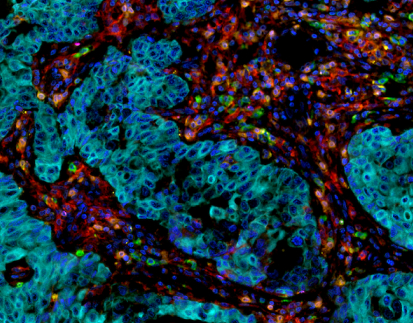Key Features of an Effective Automated Immunohistochemistry Stainer

By admin
Definition and Purpose of Automated Immunohistochemistry Stainers
Advanced machines known as immunohistochemistry staining devices have been developed to assist with staining tissue samples using methods efficiently and effectively by automating stages of the process like deparaffinization and antigen retrieval, among others to increase productivity in labs significantly. The main goal of these devices is to enhance the precision and efficiency of immunostaining procedures so that professionals like pathologists and researchers can dedicate their time to analysis tasks. The use of this technology results in outcomes while reducing the chances of errors that may occur due, to manual intervention.
Importance of Automation in Immunohistochemistry
Automation in immunohistochemistry has drastically changed how laboratories operate today; it speeds up the staining process so labs can process sample sizes in time. A crucial factor in urgent diagnostic situations, like cancer detection and monitoring requirements. Furthermore, automation boosts reliability by minimizing errors that often happen during tasks. By adopting automated systems protocols become standardized to improve result consistency over time.
Overview of Common Applications in Medical and Research Fields
Automated machines that perform immunohistochemistry tasks are widely utilized in research sectors, for various purposes. In settings, they are essential in detecting markers linked to conditions, infections, and autoimmune ailments. Scientists rely on them to comprehend disease processes and create treatment approaches. Furthermore, the accuracy and scalability offered by these automated systems prove beneficial in activities.
Benefits of Automated Immunohistochemistry Stainers
Automated immunohistochemistry stainers offer an advantage by boosting productivity in the laboratory setting. The CNT 480 Automatic Liquid Based Cytology & Immunocytochemistry Stainer, by Celnovte, is an example of this efficiency as it can handle up to 60 samples in just one cycle and complete staining within, around 2. Hours. These time-saving features streamline lab operations. Enable extensive testing each day resulting in speeding up patient diagnosis and treatment plans.
Consistency and Reproducibility in Results
Quality control is crucial, in testing as automated tools greatly improve the consistency of staining outcomes by managing reaction conditions like temperature and incubation periods to minimize variations observed in manual procedures. With protocols and the ability to reproduce results across tests laboratories can ensure consistency for longitudinal research and comparisons. This reliability is essential, for meeting standards resulting in accurate assessments by pathologists.
Reduction in Error
Manual collection and staining procedures can sometimes lead to mistakes caused by differences, in methods used and the timing and application of chemicals involved. Immunohistochemistry staining machines help reduce these risks by creating a controlled setting where each process is carried out mechanically. Automation eliminates issues, like pipetting techniques and inaccuracies in timing or labeling that could impact the reliability of samples. By reducing these possible errors through automation technology laboratories can improve the accuracy of their findings and strengthen the precision of diagnostic outcomes.
Choosing the Right Automated Immunohistochemistry Stainer for Your Lab
Before deciding to purchase an automated immunohistochemistry stainer for a lab setting it’s important for labs to carefully evaluate their requirements and workflow capacities. Given that each lab functions differently, in terms of workload and processes, it is crucial to assess the expected sample volume accurately.
Evaluating Technical Specifications and Compatibility
In choosing an automated immunohistochemistry stainer for a laboratory setting, it is important to consider how well it integrates with the existing workflows and equipment. Assessing technical aspects, like how much it can handle at once compatibility with reagents and its ability to work with software systems helps in deciding the suitable option. Selecting a system that not only meets requirements but can also be adjusted for upcoming developments, in staining methods is vital.
Considering Total Cost of Ownership (TCO)
Although the upfront cost of purchasing an automated immunohistochemistry staining system can be high initially, in a laboratory setting, it’s crucial to factor in the cost of ownership (TCO). This encompasses expenses related to upkeep and maintenance alongside consumption and the potential for downtime. An alternative cost-effective strategy involves evaluating how automation can boost productivity and lead to long-term savings by enhancing efficiency and reducing labor requirements. Hence assessing the TCO concerning anticipated outcomes is vital for making informed procurement choices within a lab environment.
Innovative Laboratory Solutions by Celnovte
Celnovte stands out as a frontrunner, in delivering groundbreaking solutions for cytology and histochemistry to improve laboratory efficiency and precision levels. Featuring state-of-the-art automated systems like the CNT 480 Automatic Liquid Based Cytology & Immunocytochemistry Stainer in their lineup highlights Celnovte’s fusion of cutting-edge technology with industry expertise. The dedicated team of specialists remains focused, on providing tools that enable diagnostics and simplify processes while aiding laboratory professionals in their pursuit of excellence. Celnovte’s dedication to excellence and creativity guarantees its position, as a leader, in the field of staining machines by adjusting to meet the changing requirements of laboratories globally.
Commitment to Quality and Innovation
Celnovte’s commitment to upholding top-notch quality standards shines through its method of product creation. The company follows testing protocols and stringent quality checks to guarantee the reliability and effectiveness of each stain remover. Integrating cutting-edge technologies allows Celnovte to create automated solutions that go beyond meeting the needs of laboratory experts. This dedication to progress empowers users of Celnovtes products to lead the way in an industry where technological advancements play a role, in enhancing diagnostic results.
Global Presence and Support Services
Celnovte takes pride in its reach to make sure that laboratories globally can benefit from their cutting edge staining technologies. The company delivers assistance services by providing training and resources to help users make the most out of their products and keep them in condition. This holistic support system establishes Celnovte as an ally, for labs looking to improve their efficiency. By fostering connections with their clients, Celnovte ensures that laboratories can fully utilize the advantages of their automated immunohistochemistry stainers .
Celnovte’s CNT 480 Fully Automatic Liquid-Based Cytology & Immunocytochemistry Stainer
The CNT 480 model incorporates methods to streamline sample preparation effectively and ensure each sample is processed optimally for results. It simplifies deparaffinization and hydration processes necessary for preparing samples for immunohistochemical analysis. By automating these steps, the system reduces the risk of error, in traditional techniques leading to quicker and more consistent outcomes. As a result, laboratories can utilize their resources efficiently improving efficiency and productivity.
High Sensitivity and Specificity Rates
The CNT 480 stainer is known for its sensitivity and specificity levels which plays a role, in accurately identifying biomarker expression in different tissues and improving diagnostic precision significantly. With the use of staining techniques and top-notch reagents, the equipment effectively reduces background interference, improves the detection of targets. This enables pathologists to interpret results with confidence resulting in diagnoses and well-informed treatment plans, for patients.
Automated Capabilities for Immunocytochemistry
The CNT 480 stainer is made to switch between liquid-based cytology and immunocytochemistry tasks. This double capability boosts the adaptability of the system. It enables labs to meet diagnostic requirements without needing multiple machines. The merging of both functions supports a method to analyze specimens which helps in saving time and resources that would otherwise be used on individual procedures. Labs experience enhanced productivity allowing a range of tests to be performed simultaneously.
Comprehensive Panel Compatibility
The CNT 480 provides users with a selection of antibody panels that work well with staining methods available in the market today. These panels are designed to be compatible with color immunohistochemistry applications which allow laboratories to delve into the intricate relationships between various antigen targets on a single slide. The reliability of the system ensures that researchers have the tools needed to carry out analyses that significantly advance their knowledge of disease mechanisms. This adaptability is revolutionary, in settings where research and diagnostic capabilities must quickly adjust to discoveries.
Ease of Use and Maintenance
The CNT 480 stainer comes with user software that makes operating the machine for lab staff to use effortlessly and efficient with clear visual instructions to help in setting up and running the system smoothly and minimize the challenge of adapting to new technology. The intuitive design not only boosts productivity but also enables lab workers to concentrate on providing accurate results With simple navigation and uncomplicated procedures the software helps in carrying out daily tasks smoothly for a trouble-free experience.
Streamlined Cleaning and Maintenance Processes
Maintaining a system, like the CNT 480, is crucial for its operation according to Celnovte’s design approach. The cleaning and upkeep procedures are optimized to minimize disruptions and prolong the lifespan of the equipment. Operator manuals and protocols are readily available to guarantee optimal system performance in the run. This approach does not reduce labor efforts. Also it safeguards the accuracy of staining processes essential, for trustworthy diagnostic results.
Enhancing Laboratory Efficiency with Advanced Staining Technologies
The incorporation of cutting-edge staining technologies, like Celnovtes CNT 480 Automatic Liquid Based Cytology & Immunocytochemistry Stainer signifies a step forward, for labs striving for increased efficiency and precision. Emphasizing its standout features, sample preparation process, heightened sensitivity levels, dual functionality aspects, and user-friendly design, these systems redefine the capabilities of immunohistochemistry stainers. By making informed choices regarding automated solutions deployment lab professionals can enhance workflows. Also it shows a dedication to achieving reliable and top-notch outcomes that are crucial, for the progress of medical research.











